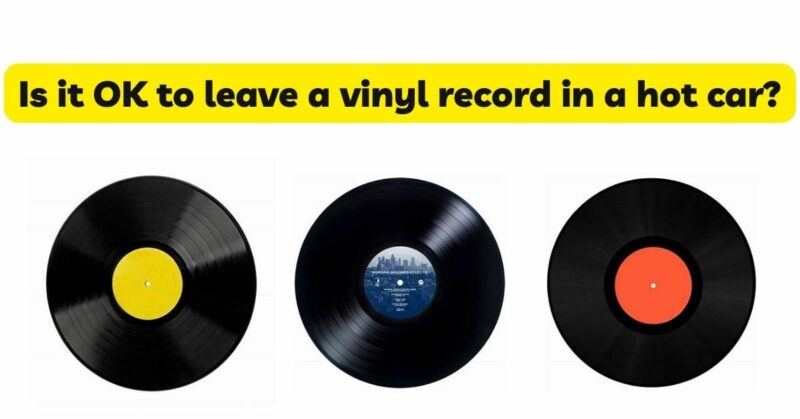Vinyl records, cherished for their warm sound and tangible experience, require proper care and storage to maintain their integrity and playability. However, situations may arise where you need to leave your vinyl records in a hot car temporarily. In this article, we will delve into the potential risks associated with leaving vinyl records in hot cars and provide insights into best practices to protect your valuable collection from heat-related damage.
- Heat and Vinyl Records: Vinyl records are sensitive to heat and can be easily damaged when exposed to high temperatures. The vinyl material used in record production is prone to warping, softening, and deformation when subjected to excessive heat. Heat causes the vinyl to expand, distorting the grooves that carry the audio information and leading to issues such as skipping, jumping, and loss of sound quality.
- Temperature Extremes in Cars: Cars, particularly when parked in direct sunlight, can experience extreme temperature fluctuations. On a hot day, the temperature inside a parked car can quickly rise to well above the outside temperature, reaching levels that are detrimental to vinyl records. The confined space, greenhouse effect, and lack of proper ventilation in a car exacerbate the heat buildup, putting vinyl records at even greater risk.
- Warping and Damage: One of the primary concerns when vinyl records are exposed to high temperatures is warping. Warped records become unplayable as the uneven surface prevents the stylus from accurately tracking the grooves, resulting in skips and mistracking. Additionally, heat can cause the vinyl to soften, leading to surface damage, sticking, and peeling, rendering the record unusable.
- Styrene Records and Heat: Some older vinyl records, particularly those produced in the 1950s and 1960s, were made from styrene, a more fragile material than vinyl. Styrene records are particularly vulnerable to heat and are more prone to warping and distortion. It is crucial to exercise extreme caution with these records as they are more susceptible to heat-related damage.
- Sunlight and UV Radiation: In addition to heat, sunlight and ultraviolet (UV) radiation can also pose risks to vinyl records. Sunlight can cause fading and discoloration of album covers, labels, and inserts. UV radiation can degrade the vinyl material itself, leading to brittleness and increased susceptibility to warping. Prolonged exposure to UV rays can also affect the integrity of the record’s grooves, resulting in compromised audio quality.
- Best Practices for Protecting Vinyl Records in Cars: To safeguard your vinyl records from heat damage when left in a car, it is essential to follow these best practices:
a. Avoid Leaving Records in Cars: Whenever possible, refrain from leaving vinyl records in a car, especially during hot weather. If it is unavoidable, take precautions to minimize the risks.
b. Cool Storage Containers: Store your vinyl records in insulated containers designed to regulate temperature and protect them from heat. These containers provide an added layer of insulation against the extreme temperatures in the car.
c. Prioritize Short Stays: If you must leave records in a car temporarily, limit the duration to the shortest possible time. The longer the exposure to heat, the higher the likelihood of damage.
d. Park in Shade: When parking your car, choose shaded areas or utilize sunshades to reduce the amount of direct sunlight entering the vehicle. This can help mitigate the temperature increase inside the car.
e. Remove Records from Direct Sunlight: If you have to keep records in the car, ensure they are stored away from direct sunlight. Place them in the trunk or covered compartments to shield them from UV radiation and excessive heat.
f. Gradual Temperature Adjustment: When retrieving vinyl records from a hot car, allow them to gradually acclimate to room temperature before playing them. This helps minimize the risk of sudden temperature changes and potential damage.
- Repair and Restoration: If you discover that a vinyl record has been exposed to excessive heat and has become warped or damaged, there are professional record restoration services available. These specialists can assess the extent of the damage and utilize specialized techniques to restore the record’s playability, although success is not guaranteed for severe cases.
Conclusion: Leaving vinyl records in a hot car poses significant risks to their condition and playability. High temperatures can cause warping, softening, and irreversible damage to the vinyl material, impacting the sound quality and rendering the records unplayable. Additionally, exposure to sunlight and UV radiation can lead to fading and degradation. Whenever possible, it is best to avoid leaving vinyl records in cars during hot weather. If circumstances require temporary storage, follow best practices such as using insulated containers, parking in shaded areas, and minimizing the duration of exposure. By taking these precautions, you can preserve your valuable vinyl record collection and continue enjoying the rich audio experience they offer for years to come.

